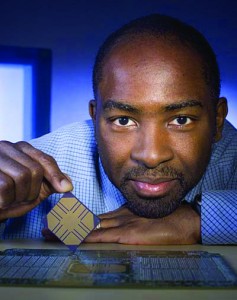The ECpE Distinguished Lecture on September 30, 2011 has been postponed due to health reasons.

Taming Heterogeneous Parallelism with Domain Specific Languages
Speaker: Kunle Olukotun, Director of the Pervasive Parallelism Laboratory and Professor, Department of Electrical Engineering and Department of Computer Science, Stanford University
Date: September 30, 2011
Time: 1:10 p.m.
Location: Alliant Energy – Lee Liu Auditorium, Howe Hall
Abstract: Computing systems are becoming increasingly parallel and heterogeneous; however, exploiting the full capability of these architectures is complicated because it requires application code to be developed with multiple programming models. A much more productive single programming model approach to heterogeneous parallelism uses domain specific languages (DSLs). DSLs provide high-level abstractions, which improve programmer productivity and enable transformations to high performance parallel code. In this talk, Olukotun will discuss the DSL approach to heterogeneous parallelism, show example DSLs that provide both high productivity and performance, and describe Delite, a framework that simplifies the development of DSLs embedded in Scala.
Speaker biography: Olukotun is a professor of electrical engineering and computer science at Stanford University. He is best known as a pioneer in chip multiprocessor (CMP) design and the leader of the Stanford Hydra CMP research project. Olukotun founded Afara Websystems to develop high-throughput, low-power server systems with CMP technology. The Afara microprocessor, called Niagara, was acquired by Sun Microsystems. Niagara-derived processors now power all Oracle SPARC-based servers. Olukotun currently directs the Stanford Pervasive Parallelism Laboratory, which seeks to proliferate the use of heterogeneous parallelism in all application areas using Domain Specific Languages (DSLs). Olukotun is a Fellow of the Association for Computing Machinery Fellow and IEEE. He received his PhD in computer engineering from the University of Michigan.